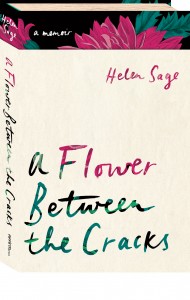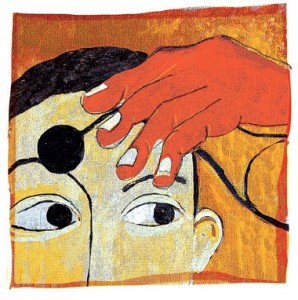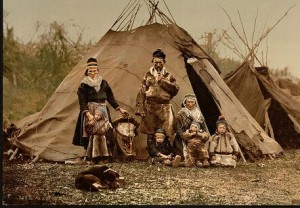
Last week I heard a wonderful radio interview with Helen Sage, a mother, whose daughter Jane, has lived with brain injury for the past 13 years.
As I listened it reminded me of so many aspects of understanding family life after brain injury: hope and grief, finding capacities and positive outcomes, ambiguous loss, and the concept of growing through trauma.
All described, not in the language of a brain injury text book, but in a compelling and personal way.
The interview centred on a new book “A Flower between the Cracks” written by Helen, about their family experience. (See the link to the interview at the end of this post, it’s well worth a listen).
I have immediately ordered the book, and hope to share more once I have read it. Meantime the interview with Helen was a poignant and enlightening discussion about the impact of brain injury.
What did I learn listening to Helen?
Brain injury happens to families
It is not the person alone, that is affected by brain injury. Brain injury (whatever the cause) affects the whole family. It also affects the wider network of friends, colleagues, community.
Helen talked about the effect on her family from the, still vividly remembered, moment they were told about the accident, continuing until the present day; thirteen years later.
At the outset Jane was in a coma for nine weeks, Helen quietly remarked that it was “hard to sit and wait for that length of time”.
As supporters it is important to remember the journey family have had, and will continue to take. We are only a small part of that journey.
Families are doing their best and we need to listen to their experiences, and not impose our own views however strongly we feel they are needed!
The nature of grief and loss after brain injury
Helen talked about the difficulty grieving when your family member is alive, but different. This is a specific kind of grief you might see termed “ambiguous loss”. This is so, whatever the cause of brain injury.
In a nutshell, ambiguous loss is when a person is ‘there but not there’ – the person is present but changed.
When a person has a brain injury some of their old self remains, but the person is often different in some way. Helen talked about Jane having some of her previous personality but also having new aspects they needed to get to know.
Helen talked about loss of the old Jane and beginning to learn the new Jane. Weaving threads of old Jane into life, so that all that is past is not lost.
After brain injury, grief can be considerable, long lasting, and difficult – we do not necessarily have a way to grieve when a person is still present.
When a person dies; there is generally support from family, friends and community. There are rituals (such as funerals) to assist grief. This does not happen when a person has changed, but is still present.
In addition, family often have no time for grief while care giving, managing crises, and possibly taking up other roles as a result of the changes within the family.
As supporters it is vital we understand and are sensitive to the impact of ambiguous loss and the particular grief that comes with it. At the very least we should not be adding to grief and sadness through our remarks or actions.
If you are interested in learning more, Pauline Boss has written much about Ambiguous Loss. Pauline has recently written a book specifically for people living with Dementia. “Loving Someone Who Has Dementia”
Hope and Happiness can exist alongside grief
Helen talked about hope and happiness, that sits alongside sadness and grief.
“Joy and grief can reside side by side.”
“Jane of yesterday danced through my mind”
And through a poem, the sadness:
“..Hospital workers seem desentitised to your state, mute, limp as a doll, …
Their hearts unbroken ours are bereft”
There are positive outcomes from brain injury
Helen described Jane as having new capacities, not just disabilities.
As an example she described Jane’s ability to stay in the present moment as a capacity that brings Jane contentment. Helen was not ignoring the difficulties, stating Jane finds it “Difficult to reflect on past or to anticipate the future” as a result of memory difficulties and cognitive impairment hence she lives in the present.
We are often much more ready to see the difficulties, the disabilities, the can’t do, the problems. A bonus for everyone, if instead we are able to look for what is possible, what positive outcomes can be found. Not in a Pollyanna way, in a real way.
Finding meaning
Helen talked about finding the work and concepts expanded by Victor Frankl useful for her. She talked in particular about the impact of his book “Man’s Search for Meaning”.
Lessons she took from Frankl’s writing included maintaining hope and remaining optimistic despite tragic circumstances. Frankl believed that it did not benefit to ask ‘Why did this happen?’ but rather “now that his has happened, how do I respond courageously and responsibly”.
Victor Frankl writes from experience as a psychiatrist, a neurologist and a holocaust survivor. ‘Mans Search for Meaning’ can be confronting but worthwhile as he describes his life experiences and the learnings from it. His work is about more than survival, it is about finding meaning ,hope, motivation, in all situations however difficult.
Looking for strengths
As a very simple description – a strengths based approach encourages us to look at what a person is able to do and build on this, rather than focussing on the difficulties.
Listening to Helen talk about their situation, and how she encourages Jane to improve, it seemed an example of a strengths based approach in action. An approach we as supporters should be aspiring to.
Helen was looking for what was possible for Jane to achieve by identifying her strengths. She was then able to build on these and develop Jane’s skills. Examples include:
- Writing letters to Jane, while Jane was not able to respond to share later.
- Encouraging Jane to use poetry to describe what was happening to her
- Recognising that Jane’s intellect, “her essence” was still there, despite significant communication and physical issues
- Jane herself identified one of her own strengths when she said “Patience is my forte.”
Here is a short video clip with Victor Frankl whom I talked about above. This clear message delivered with humour , challenges us to encourage people to achieve:
Supporting family life after brain injury
Understanding the impact of brain injury on families and working in a way that is supportive and sensitive to families is vital.
Hearing life stories such as that of Helen Sage, helps remind us of the extraordinary journey families make. It also reminds us that supporting the family rather than trying to change them, is ultimately more helpful.
[unordered_list style=”green-dot”]
- Each family functions differently, be careful not to judge or compare other families to your own experience.
- Listen, really listen, and try to understand how it is for the family you are supporting. Who are they? What are their needs? How might these needs might be met?
- Understand families are doing the best they can, given their situation.
- Work together, and alongside to support family life after brain injury.
- Avoid advice giving, unless you are truly asked for it, and have the experience and expertise to provide it.
- Be respectful of each family’s culture and beliefs in all aspects of family life and care.
[/unordered_list]
Here is a link to the interview with Helen Sage
This interview was on the Australian ABC Radio National program ‘Life Matters’ with Natasha Mitchell.
[box style=”rounded” border=”full”]Radio Interview with Helen Sage[/box]



While travelling in the car today I heard Helen interviewed on ABC Morning program. Truly inspirational. The journey certainly is one for the whole family.
Thanks Jan, yes I only heard a small part of the interview. For those of you who did not hear the discussion today I will try and find the link and post it. Yes I know this should be simple,while I may have 25 years experience supporting people with brain injury I am new to podcasts and all that kind of thing so when I just need a bit more time to figure it out!
For those of you more savvy than I – here is the link I believe it should appear on; The Conversation Hour
I would welcome anyone posting the actual link to the discussion.
Regards
Melanie
Pingback: In So Many Ways Life Changes after Brain Injury. - Changed Lives, New Journeys
Pingback: Wondering Who You Are - Changed Lives New Journeys